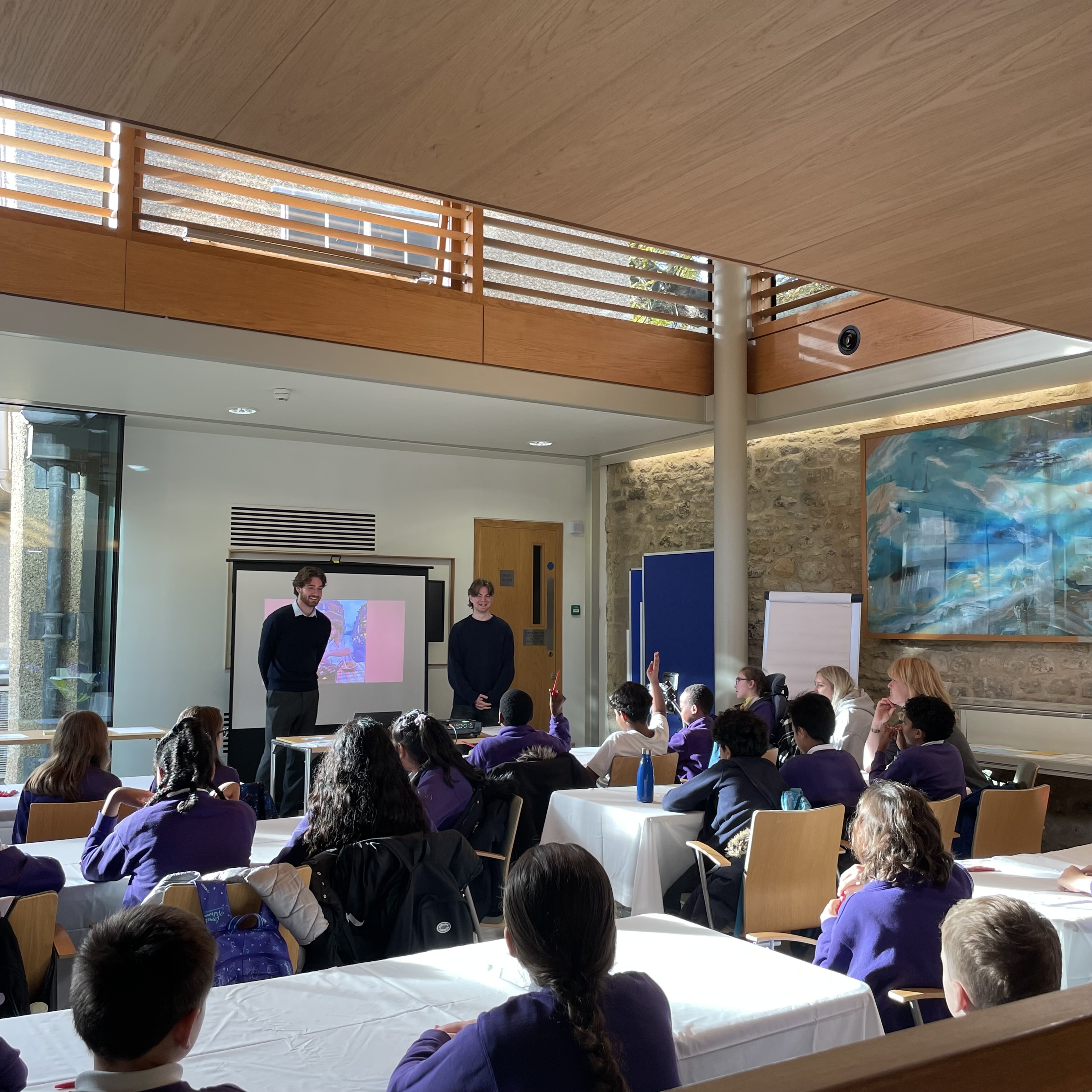The Queen’s Translation Exchange runs termly Book Clubs for Schools, where we read and discuss fiction in translation. The Translation Exchange also encourages students to set up such Book Clubs in their own schools, using our Guide. We were delighted when sixth former Muskan Goyal got in touch with regular updates. Read on to find out the great books they chose.
15/09/2022
Of course, the idea to run an international book club at my school (Nottingham High School) came from attending those run by Queen’s College Translation Exchange. So much did I enjoy the opportunity to have my own space to discuss foreign novels with like-minded, literature-loving peers, I simply could not wait to open up this opportunity to students in my own school. The cross-cultural exchange and linguistic creativity that the book club engenders as a result of this fantastic initiative meant I could promote it with full confidence. Through this activity, students will be provided with the development they need to think critically and articulate their thoughts in an eloquent manner.
The initial meeting was simply intended to gauge interest in the book club in terms of logistics; I needed to meet and talk to those interested in order to establish what they hoped to gain from the sessions. There was a definite enthusiasm for reading literature from all corners of the world and not simply the West; though we start with a Spanish novel, I have no doubt that perhaps an Arabic or maybe Chinese novel will soon follow. In the end, no fewer than 30 people expressed their interest in this club! I have now created a google classroom to share details of meetings and to use as a forum for recommendations for international literature as a whole. I intend to post a variety of novels, poetry and articles in general that I have enjoyed, along with encouraging others to do the same. This way, I believe we will be able to create a truly rich forum where the cultural exposure and knowledge we will uncover together will be boundless. I cannot wait for our first meeting on Friday, 14 October.
14/10/2022 – The Island, by Ana María Matute (trans. Laura Lonsdale)
Our first session focused on The Island, written by Ana María Matute and translated by Laura Lonsdale. The book focuses around the central character of the rebellious teenager Matia, who, after her mother dies and her father abandons her, is sent to live with her domineering grandmother on the scorching island of Mallorca. Shaped by the circumstances of the Spanish Civil War, The Island is a moving coming-of-age novel, where communities tear themselves apart, and Matia learns about the adult world in ways that she could not previously have foreseen.
The session was an absolute success, with 15 students from across years 10 to 12 attending! We initially started off as a collective group, inviting students to introduce themselves and give a short summary of their first impressions of the book; this led into general discussion in 2 breakout groups, at first stimulated by the questions provided by Queens’ College but quickly progressing into reasoned discussions on a particular aspect of the book. It was delightful to see all members debating and discussing their varying viewpoints and interpretations – you could truly see each student building off what had already been said and really extending their creative thinking and analytical skills. We all walked away from the session with a completely different perspective on the book, and the context surrounding it; this, for me, really does embody the beauty and the benefits of discussing literature. We rounded off the session by inviting a member of each breakout table to give the group a summary of what had been discussed, presenting what they found to be most controversial or compelling. Through this sharing of ideas, it was made clear that we all shared certain ideas and outlooks and also diverged in some – this element of debate and disagreement being key in introducing a sense of complexity in our understanding of the novel.
Our next session will be on the French novel Under the Tripoli Sky written by Kamal Ben Hameda – I cannot wait!
18/11/2022 – Under the Tripoli Sky by Kamal Ben Hameda (trans. Adriana Hunter)
Last Friday, the International Book Club met for the second time to discuss the novella, Under the Tripoli Sky. Originally written in French, this story tells the tale of a young boy, almost invisible to those around him, who enjoys listening to the whispered stories of the women who surround him. Though many key issues ranging from misogyny to poverty are explored throughout the novel, the overwhelming focus of the tale is on the women of Tripoli – strong, resourceful and interesting, yet continually succumbing to societal expectations and the domination of men. In our meeting, we explored these power imbalances further, more importantly, perhaps, also considering their relevance to modern society. A particularly interesting aspect for us to consider in our meeting was the difference between literal and liberal translation; literally, ‘la Compagnie des Tripolitaines’ translates to ‘the Company of Women from Tripoli’, however, as we all discussed, this is perhaps not the most interesting of titles. A key point of discussion, therefore, was whether the title ‘Under the Tripoli Sky’ wholly captures the essence of the novel; or whether translations can ever completely capture the beauty of the original language. An interesting debate was thus carried out, and we truly loved sharing our views and interpretations – what was most satisfying, for me, was discovering slightly different takes on the novel through the varying viewpoints presented by those present. I think we can all agree that we walked away with a wholly different understanding and perspective of the book from that with which we entered at the start of the session. Overall, definitely, a book that is worth a read, perhaps as it was unlike anything we had read before – in only 100 pages, we were able to discover the pre-Gaddafi world, and for that, we enjoyed it immensely!
20/01/2023 – Trick by Domenico Starnone (trans. Jhumpa Lahiri)
On Friday, the International Book Club convened again, this time to discuss the novel Trick, written by Domenico Starnone. Originally written in Italian, the story revolves around the conflict between lives past and present, along with the development of the relationship between Grandfather Daniele Mallarico and his 4-year-old Grandson, Mario, whom he barely knows.
Asked to return to his childhood home in Naples to care for Mario, Mallarico is presented as having no desire to return to the reminder of his troubled adolescence. Walking through its familiar hallways once again and returning to the rooms he once occupied forces an unwanted evaluation of what once was with what has become – and though these shadowy apparitions of his past life do not speak, they remain crouched in the darkness, and nudge him to reopen his past insecurities.
A particularly striking moment for us all in the novel was Mallarico’s drawing conflating his childhood with the present; he unconsciously placed Betta (his daughter) in his mother’s characteristic pose in the kitchen 60 years previously. Delving deeper into the context of this novel, we found an interview with Domenico Starnone conducted by Massimo Rizzante, head of the University of Trento’s Department of Humanities; here, Starnone discussed his wider belief of childhood as the truly authentic phase of life. In his books, though the protagonist often leaves the city to realise his ambitions and self-worth, this realisation often remains unfinished, with Naples being held responsible for this sense of dissatisfaction and disappointment. A line in the novel we thought fit quite well into this context was Daniele’s reflection that ‘only in this city […] were people so genuinely inclined to come to your aid and so ready to slit your throat.’ Indeed, this is the Naples which many readers are familiar with through pseudonym writer Elena Ferrante’s Neapolitan series, My Brilliant Friend – it was interesting to discuss the implications of the widespread rumours that Starnone and his wife were in fact Elena Ferrante, and how this changed our understanding of Trick.
Daniele’s situation battling with the past, present, and what could have been is also reflected in the assignment set by his publisher to illustrate ‘The Jolly Corner’ by Henry James. In this novel, the author’s alter ego returns to his childhood house – only to encounter the ghost of the pompous, obnoxious businessman he would have become had he not left the United States for Europe. When illustrating this novel, Daniele improves the drawings of these ghosts by switching between those in James’s novel to his own earlier Neapolitan self-lurking in the apartment; we see how the raw, energetic, and violent personas he suppressed, were successful in achieving a more controlled life – but also, as we reflect, an ultimately emptier life, devoid of meaning. As in the Jolly Corner, for Daniele, a lifetime’s vocation is called into question, where we view his panicked agonising on the contributing factors which result in the person we see today.
Another key theme which we discussed in the meeting was Daniele’s brooding that his talent has deserted him – once a celebrated illustrator, now his phone seems to ring less and less with business propositions. It was interesting to compare this with Starnone’s own situation, and how he also dreamed of being a writer as a boy, but then gave up, convinced of his lack of talent. Though he enjoyed reading, especially Kafka’s A Letter to my Father, this in fact had a discouraging effect on him, with him reasoning that if this had already been written, then what did he have to contribute? This pleasure of reading and learning collided with his desire to write, paralysing him, and we also view this with the relationship between Mario and Daniele; at first, though Mallarico feels annoyed and overwhelmed, ‘trapped by that instruction-manual voice,’ eventually Daniele begins to see a hint of himself in his grandson. As it turns out, Mario also is an unforgiving critic, saying the images are a ‘little dark’ and instructs Daniele to make them lighter next time. This tension between ‘darkness’ and ‘light’ continues throughout the novel, with eventually Mario pushing his grandpa to step out of the gloom. This also reflects Starnone’s own belief, that a text cannot be interpreted correctly by the author himself; instead, they truly discover what they have written thanks to their readers, with every reader able to find something different.
We had a fantastic time discussing Trick, with everyone contributing their individual perspectives on the novel; overall, a brilliant novel, and definitely worth a read! Link to Interview with Starnone: Il meccanismo incompiuto della letteratura. Intervista a Domenico Starnone | Zibaldoni e altre meraviglie
10/03/23 – A Whole Life by Robert Seethaler (trans. Charlotte Collins)
This Friday, our International Book Club met again to discuss Robert Seethaler’s A Whole Life, translated by Charlotte Collins. Originally published in German. Seethaler invites the reader to follow him into the seclusion of an unspectacular village nestled in the alpine world, where the story of a man, Andreas Egger is told. A difficult, sparse life is recounted, devoid of comfort from the outset; as an orphan, he experiences a childhood marked not by love, but beatings, yet he endures this without any complaint or bitterness. This attitude proceeds to form the basis for his approach to the rest of his experiences in life as well; though consistently unspared from the blows of fate, nothing is able to penetrate Egger’s morale – not being held captive in Russian prisoner-of-war camps, not even the loss of his newly wedded wife. Egger continues to persist in remaining upright and true to himself, rarely swaying considerably from his path. ‘Yes, people can handle it’, Seethaler says about his novel. ‘There are so many people who experience loss…and I believe you can go through it and emerge even stronger. That’s not me romanticising, it’s just the idea I have’.
Any consolation of faith is also distant – Egger ‘never had the embarrassment of believing in God, and death did not frighten him’. Life is not presented as a test before God, possessing some higher significance or meaning – instead, it is simply a state of pure being.
It was interesting to discuss the book’s measure of his life in a calm, extremely brief and pointedly unspectacular way. The strength of the story, we thought, seemed to lie in the fact that Seethaler essentially presents an antihero in Egger; he is content with himself, accepting the facts of the present without forfeiting his own agency. At first glance, it may seem that Egger does not accomplish anything extraordinary, however this is precisely what makes him likeable in his own unique manner – his character is brought a lot closer to the everyday reader. Finally, the focus of a story is not on the superhero saving civilization but on a person you might truly meet in real life. Seethaler’s confinement to fundamentally simple and straightforward language is what further allows the novel to have such weight – a few, quiet words are used to draw the intensity of the images that unfold before the reader’s inner-eye. To appreciate these in their entirety, as viewers we must slow down and look more closely – only then are we able to discover the sheer wealth of seemingly small details, cloaked by the narrative’s simple exterior. ‘So, life is a life’, Seethaler says. ‘For me, it was important to erase all of this ornamentation that doesn’t really touch your soul…It’s always about the same thing: about survival, about love, about strength, about death’.
There is something timeless and also placeless in the deliberately reserved narrative of Egger’s life – and this is exactly what Seethaler intended.
We therefore understand that this novel is as much a story about death as it is about life. Instead of perceiving death as tragic, Seethaler instead invites us to accept death as redeeming, inherently belonging to life. Indeed, the novel begins with death, recounting Egger’s attempts to save the dying goatherd, Hörnerhannes. During their interaction, Hörnerhannes describes death as the ‘cold lady’, before desperately running away, attempting to evade her. Egger’s own confrontation with death at the end of the novel brings the story to a full circle, however his experience with the cold lady is remarkably different. For him, the cold lady appears in the form of Marie – at last reunited with his love in the final moments of his life, a beautiful farewell follows as Marie finally takes him with her to the other side.
Therefore, whilst Egger ‘couldn’t remember where he came from, and ultimately didn’t know where he was going…he could look back on the time in between, on life, with no regrets, with a ragged laugh, and a single great amazement’. Seethaler reflects that Egger ‘has the gift of taking life as it is. That’s a gift few people have’. A great calming power emanates from the book; the hardships and exertions of our sheltered existence seem remarkably small when compared with the distant archaic universe of the mountains. Yet this world is described in such a way that it does not appear strange and remote – rather, it resembles what we all carry within ourselves, the landscape of the soul and the simple moments, both big and small, that construct our identity.
All in all, a unique novel delving into the simple, yet profound concepts of solace and truth and definitely worth a read!
More to come…


